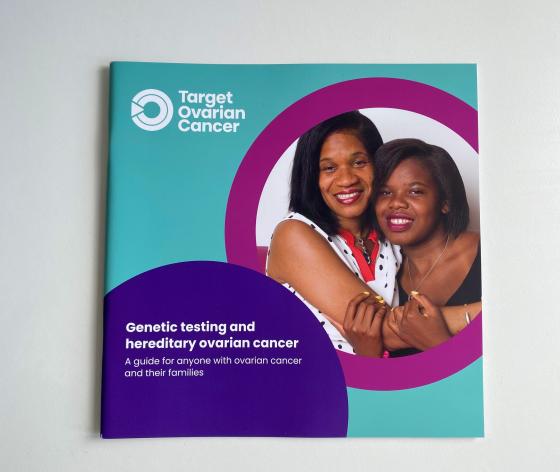Hereditary ovarian cancer is most commonly caused by a variant in either the BRCA1 or BRCA2 gene. Some variants in other genes such as RAD51C, RAD51D, BRIP1, PALB2 and mismatch repair (Lynch Syndrome) are also known to increase the risk of ovarian cancer, but researchers haven't yet found all the genes linked to an increased risk.
How do variants in genes cause cancer?
Genes are instructions made from DNA, which tell the cells in our bodies how to work. Every cell in our body contains genes that decide and control our body's functions, growth and appearance. Each person has two copies of most genes, one inherited from their mother and one from their father.
In general, our genes enable our cells (the building blocks that make up our body) to function normally. But sometimes the genes that we have inherited have small changes, known as genetic variants. If one of our genes has a variant, this can sometimes result in an increased risk of developing different illnesses compared to those who don't have it.
Someone with a gene variant has a 50 per cent (one in two) chance of passing it on to their children.
What are the BRCA1 and BRCA2 genes?
The BRCA1 and BRCA2 genes (BReast CAncer genes) were discovered in the mid-1990s in families that had a lot of cases of breast cancer.
BRCA1 and BRCA2 genes normally help protect you against cancer because they help repair breaks in DNA that can lead to cancer. But variants can occur in these genes that can increase the risk of developing breast cancer. They also increase the risk of developing ovarian cancer in a woman’s lifetime from two per cent (two in 100 chance) to:
-
Up to 60 per cent (60 in 100 chance) for BRCA1 gene variants.
-
Up to 30 per cent (30 in 100 chance) for BRCA2 gene variants.
Variants in the BRCA1 or BRCA2 genes account for most hereditary ovarian cancers. About 15 per cent of women (15 in every 100) who develop ovarian cancer have a variant in either their BRCA1 or BRCA2 gene.
Gene variants can increase your risk of cancer, whatever your sex. It's important to understand that not everyone who inherits a variant in their BRCA1 or BRCA2 gene will develop cancer but it does greatly increase the risk.
Which other genetic variants put me at risk?
Variants in the BRCA1 and BRCA2 genes account for most hereditary ovarian cancer cases. But variants in other genes can also increase risk of ovarian cancer:
-
Lynch Syndrome (which used to be known as Hereditary Non-Polyposis Colorectal Cancer or HNPCC) increases the risk of bowel cancer. It’s linked to variants in one of the genes MLH1, MSH2, MSH6 and PMS2. A woman with a variant in the MLH1, MSH2 or MSH6 gene also has an estimated 10 to 17 per cent (up to 17 in 100) chance of developing ovarian cancer at some point during her lifetime. There's no significant increased risk of developing ovarian cancer for PMS2. The chance of developing other cancers including in the lining of the womb (endometrium), small bowel, urinary tract, stomach, gall bladder and pancreas can also be increased by a variant in one of the Lynch Syndrome genes.
-
Variants in the RAD51C, RAD51D and BRIP1 genes can increase the risk of developing ovarian cancer. But these variants are very rare. If you have a RAD51C gene variant there’s a 5–20 per cent risk (up to 20 in 100 chance) that you will develop ovarian cancer in your lifetime. If you have a RAD51D gene variant there’s a 5–25 per cent risk (up to 25 in 100 chance). If you have a BRIP1 gene variant the risk of developing ovarian cancer is 5–10 per cent (up to 10 in 100 chance).
-
Variants in the PALB2 gene mainly increase the risk of developing breast cancer. PALB2 genetic variants give you a small increased risk of ovarian cancer of 2–10 per cent (up to 10 in 100 chance) across your lifetime, almost all of which happens after the age of 50.
Variants in the STK11 gene may also increase the risk of developing ovarian sex cord-stromal tumours – a different type of ovarian cancer. Variants in this gene cause Peutz-Jeghers syndrome, which is an extremely rare condition estimated to affect one in 100,000 people. While evidence is limited, it’s suggested that people with Peutz-Jeghers syndrome have an 18 per cent risk (18 in 100 chance) of developing a gynaecological cancer by age 70. Gynaecological cancers include ovarian, cervical, womb, vulval and vaginal cancers.
Variants in different genes carry different increases in risk. A clinical geneticist (a doctor who specialises in genetics) or a genetic counsellor will be able to give you a more accurate and personalised risk assessment.
Last reviewed: November 2022
To learn more about our review process, take a look at our information standards.



